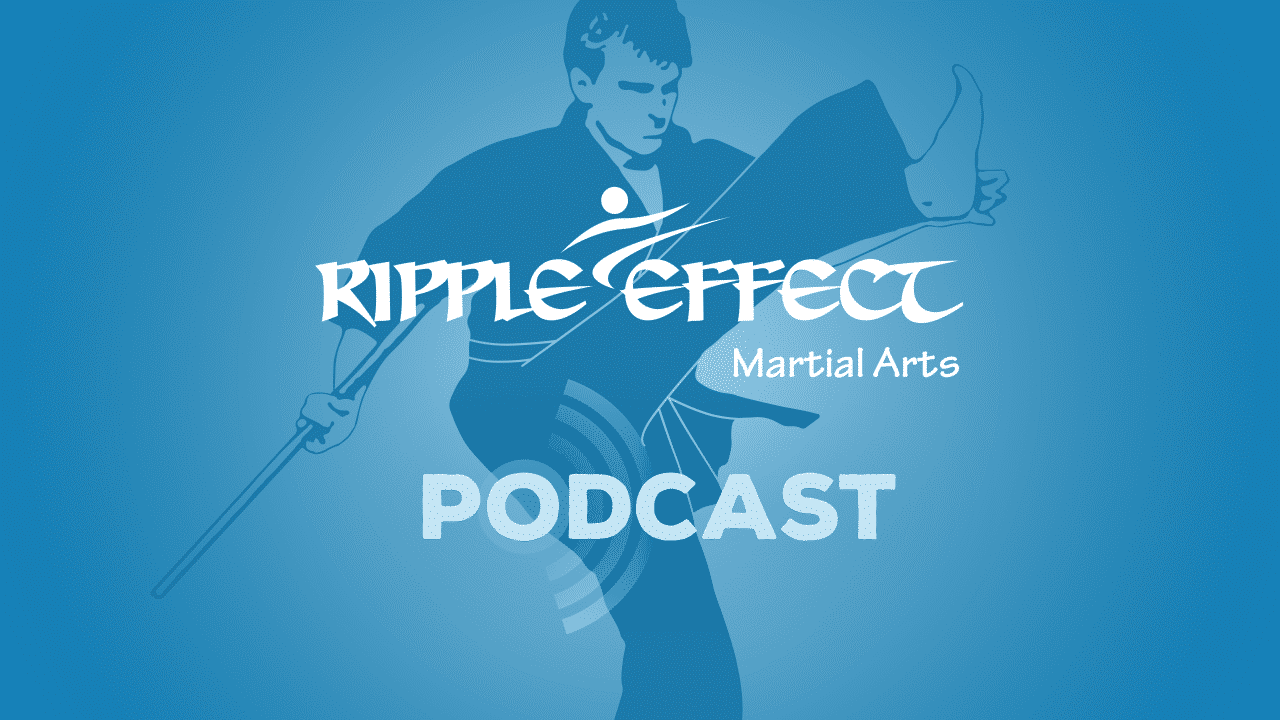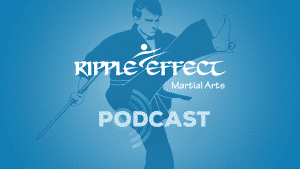How did you get your start in the martial arts?
I’ve been interested in martial arts for as long as I can remember. When I was a kid I loved looking at the pictures of martial arts schools in the phone book. I took a few classes when I was little, but really got started at about 10 years old.
I started training with my [twin] brother. We really helped each other along.
There was a board break some years back, and you were a red belt (I think). You came up in front of everyone and did a break with a jump reverse side kick. That was when I knew you knew your stuff.
All the traditions at Ripple Effect really made me feel right at home when I started training again.
You’re a professional graphic designer. How do you approach creating images that capture people’s interest in the martial arts?
My background is in advertising. I always begin with trying to find the hidden gem in what you do. The unique angle that lets you tell a story. There are so many ways to communicate the benefits of martial arts.
What are some of the benefits for you?
For me it was confidence. Having a loud voice. Confronting fears. Martial arts has brought out a confidence in me that I’ve taken with me my entire life.
You’re also a full-time karate instructor. How is it going from black belt student to black belt instructor?
It’s so funny because you do martial arts for a long time, and think that instructing from the floor will be very natural. But you learn very quickly that teaching is different from learning it yourself. Even though you know all the moves and the curriculum and the disciplines, you have to adapt your skill set to different ways of learning.
Connecting with kids on a personal level is my strongest skill as an instructor. Helping kids over the anxiety that most kids have when they’re just starting karate. Their balance is a little off, they get confused. It’s hard to perform and be loud in a big group like that.
I try to connect individually to help kids get over that anxiety. We talk about their favorite animal, for instance, which takes the edge off kids’ anxiety. It’s a strength I’ve worked really hard to develop.
You said martial arts gave you confidence—do you have any stories about how martial arts tested your confidence?
The cool thing about my experience is that I got to share it with my [twin] brother. We were always a little team getting on the mat together. It was really comforting to have a friend in class with me all the time.
My brother got injured in middle school and wasn’t able to continue training. I remember that first test when he wasn’t with me. It was really terrifying, being up there by myself. That was a really difficult test. I didn’t pass. But it motivated me to keep going and eventually test for my black belt.
Did your brother continue to support you in earning your black belt?
Oh absolutely. He was my biggest fan, cheering on the sidelines while I was testing. I had to come up with a creative form, and we did that as a collaboration. Picking the moves, picking the moves together.
How do you be compassionate as a teacher when you also have to be stern, to judge kids as they test?
The challenge is to remember that letting a student pass, or even getting any with something that’s not their best, is not serving that student. That best thing we can do for kids is to push them to do their best.
They have to put effort into it, or face consequences [failure] when they don’t. As an instructor, you can see those things, recognize what kids are capable of.
What about teamwork when it comes to karate? Is it an individual or a team sport?
I’ve learned after 12, 15 years in the martial arts, that there’s a great aspect of the sport that’s really team oriented. You perform your forms [katas] by yourself, but to be in sync with dozens of other martial artists around you, it’s incredible.
You don’t develop that skill right away. It takes years, and really only takes shape once you test for and earn your black belt. But the teamwork aspect is central to martial arts.
What about the mental aspect of martial arts?
It is not easy. You have dozens of forms and combinations to learn through your first black belt test. You have to have confidence so you can perform these moves at full speed and power. You also have the memorization aspect of words of the belt. It really pushes the mental side of martial arts.
I really like that it pushes me in that way, because it keeps me from being comfortable. We don’t make it easy, we make it a challenge.
Can you still see the white belt in the black belt who’s about to test, four years down the road?
Yeah, you see that little glimpse of that student’ who’s just started. What’s amazing to see is the advancement in personality. Of the karate student as a human.
Because during that four years of training you’re learning and growing as a human too. It’s not just the physical skills that get better, it’s your personality too. The marital arts helps us become better humans.


